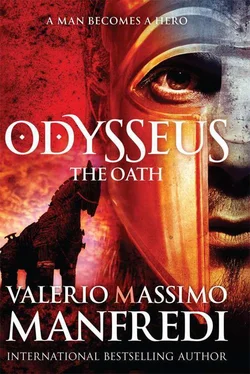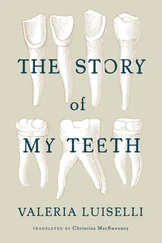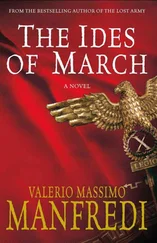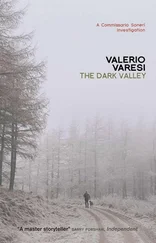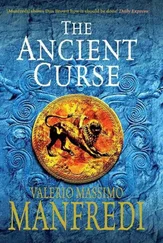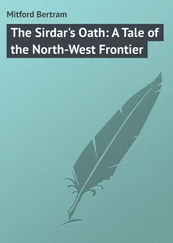Valerio Mafredi - The Oath
Здесь есть возможность читать онлайн «Valerio Mafredi - The Oath» весь текст электронной книги совершенно бесплатно (целиком полную версию без сокращений). В некоторых случаях можно слушать аудио, скачать через торрент в формате fb2 и присутствует краткое содержание. Год выпуска: 2013, ISBN: 2013, Издательство: Macmillan, Жанр: Исторические приключения, на английском языке. Описание произведения, (предисловие) а так же отзывы посетителей доступны на портале библиотеки ЛибКат.
- Название:The Oath
- Автор:
- Издательство:Macmillan
- Жанр:
- Год:2013
- ISBN:9780230769335
- Рейтинг книги:3 / 5. Голосов: 1
-
Избранное:Добавить в избранное
- Отзывы:
-
Ваша оценка:
- 60
- 1
- 2
- 3
- 4
- 5
The Oath: краткое содержание, описание и аннотация
Предлагаем к чтению аннотацию, описание, краткое содержание или предисловие (зависит от того, что написал сам автор книги «The Oath»). Если вы не нашли необходимую информацию о книге — напишите в комментариях, мы постараемся отыскать её.
The Oath — читать онлайн бесплатно полную книгу (весь текст) целиком
Ниже представлен текст книги, разбитый по страницам. Система сохранения места последней прочитанной страницы, позволяет с удобством читать онлайн бесплатно книгу «The Oath», без необходимости каждый раз заново искать на чём Вы остановились. Поставьте закладку, и сможете в любой момент перейти на страницу, на которой закончили чтение.
Интервал:
Закладка:
‘A bow is a powerful weapon: it allows you to take shelter and kill from a distance. Many think that a true warrior should use a sword and confront his adversaries in hand-to-hand combat. They believe the bow is the arm of a coward.’
‘Isn’t that so?’
‘Not at all. In battle, the most important thing is to win. All weapons are equal if they serve their purpose: taking your enemy’s life. If you win, you survive; if you lose you die or end up as a slave for your whole life. The bow is a noble weapon. An arrow flies whistling through the air, faster than the wind, swifter even than a bird, even without their wings. It strikes your target at a great distance and allows you to procure food for yourself in situations where any other weapon is inefficient or useless.’
We stopped only once a day. Damastes would take some bread and goat’s cheese from his bag, we’d drink water from a spring and then continue until dusk. When we got back to the palace, we would report to my father about the progress I’d made.
Last of all, Damastes taught me to use a sword.
‘This is the most terrible of weapons,’ he said. ‘To strike you have to be close enough to the enemy to look into his eyes, to feel his breath on your face. When you deal the blow you will run him through from one side to the other; his blood squirts out at you, his bowels burst out of the wound, the smell is nauseating. The screams of battle become overwhelming, the clanging of bronze deafening. And that’s what men call “glory”. That’s what the poets sing of when they celebrate the deeds of heroes, accompanying their words with a lyre.’
I wasn’t sure what he meant by that. It seemed however that the toll of my passage into manhood was learning about all the ugliest aspects of life and of other human beings.
Sometimes we slept out in the fields or in the forest, wrapped up in our cloaks, on a bed of dry leaves. Before I fell asleep I would watch the stars glittering between the leaves on the trees and ask myself what they really were. Had they been put up there by the gods to guide sailors on their route home? Mentor had taught me to recognize the constellations: the Bear and Orion and the Pleiades and even more, and I knew that one day I would have to use that knowledge out at sea, to navigate a crossing or make a long voyage.
One night I saw the owl again: for a moment it was only her eyes with their golden reflections staring at me, and then the goddess emerged from behind a trunk. She wore a dress the colour of the moon, her bare feet skimmed the grass of the field. Pale flashes danced across the tip of her spear. A fragrance accompanied her, a scent of forged metal, of olive and cedar and wild flowers. I hung on to those notes that I could barely perceive and became inebriated. I wanted to call out to her, but nothing came out of my mouth: mortals are not allowed to address a god unless they will it. And yet she turned as if she had heard me; she smiled and disappeared. The owl left her perch on the branch and flew off through the sweet-smelling night.
‘You were talking in your sleep last night,’ Damastes said to me in the morning. ‘What were you dreaming?’
‘I wasn’t dreaming anything,’ I replied. ‘I was too tired to dream. I was sleeping, that’s all.’
ALL THAT YEAR, for as long as the season held out, my father went to sea for voyages of fifteen, twenty days; sometimes with a few trusted friends, at other times with his warriors. I suppose he was going to the nearby islands that constituted our kingdom: to Same, Dulichium, Leucas, maybe even to Zacynthus, to meet with the noblemen who provided spears for our army and ships for our fleet. Black, shiny ships, superbly crafted. Once, I believe, he went out for plunder and took his warriors with him. They returned with the signs of combat on their bodies and faces, and brought back coppery-skinned slaves, jugs full of wine, timber, richly coloured fabric and hundreds of beautiful glass beads. The booty was split up after the king had taken his share.
Some of the slaves wept, surely thinking that they would never see the day of their return. It upset me to see their despair. My father put his hand on my shoulder: ‘This is the law of life. The same thing could have happened to me or my comrades — to become the slaves of worthless men, of merchants or fools, or to be exchanged for a handful of coloured glass beads. And no one would have taken pity on us. Save your feelings for people you love, if one day they should suffer ills or lose their lives or their freedom.’ Having said that, he walked off without waiting for me and headed to the palace, where the women were waiting for him with a bath and clean robes taken from the cypress chest.
I followed him and watched while he was bathed. ‘Father,’ I asked him, ‘what happens to a king if he is captured; does he become a slave?’
‘A king has a good chance of being freed because he can pay a considerable ransom: gold, silver and bronze, weapons, livestock, precious fabrics. No one would want to hold on to such a slave when they could buy themselves dozens of slaves, just by sending him back.’
‘But what if it did happen?’
Laertes paused thoughtfully for a few moments and when he spoke again his face had an enigmatic expression, as if someone else were talking through his mouth: ‘He would become a slave like the other slaves; he would obey his master so as not to be beaten and he would try to please that master in order to have better clothes and food.’
‘Anyone else,’ I insisted, ‘not you.’
‘Who can say? When a man loses his freedom he loses everything. There’s only one thing worse than losing your freedom: losing your life.’
I went out into the corridor, climbed to the upper terrace and waited for night to fall.
Once the autumn had arrived and the season for voyaging at sea was over, King Laertes had the heavy steering oar removed from his ship and hung over the hearth so it could absorb the smoke and harden in the heat.
We often had visitors and guests. Some of them, not many to tell the truth, had come from afar, on ships which sought shelter in the port. My father felt these were the most interesting, because they had sailed through bad weather and that made them brave or desperate or both things together.
One of them brought us news of Hercules.
The king of Mycenae, Eurystheus, not daring to take on Hercules directly, had ordered him to cleanse his guilt by carrying out a number of impossible tasks. Hercules made no objection and departed forthwith. No one had seen him since. I asked my father what these tasks were, but he didn’t know or he didn’t want to tell me. He wasn’t even sure that Hercules had ever owned up to killing his whole family. I could tell that my father still refused inwardly to believe his friend had been responsible for such a heinous act. He did tell me that Eurystheus was capable of any iniquity and that anything could be expected from a villain like him.
I would have liked to know what my father was referring to but I didn’t insist any further. I imagined Hercules with his club in hand wandering through desolate and deserted lands to seek out an adversary who was worthy of him, be it man or god or monster, for a fight to the death. Perhaps the only way for him to find peace.
‘I imagine that next summer we’ll learn more,’ said my father. ‘We’ll be making a voyage.’
‘A voyage?’ I said. ‘And you’ll take me with you?’
‘Yes. It will be something you won’t forget.’
‘Can’t you tell me more?’
‘In time,’ replied my father, and that meant no more questions.
With the return of the good weather, we took the oar down from its place over the hearth and fitted it back in position. The ship needed work to make it seaworthy again. The servants had to clean away all the encrustation and pull at the ropes that held the planks together to tighten them. I watched them using pumice to scrape and smooth the stern, the bow and the hull, and then oil to buff and polish all the wood.
Читать дальшеИнтервал:
Закладка:
Похожие книги на «The Oath»
Представляем Вашему вниманию похожие книги на «The Oath» списком для выбора. Мы отобрали схожую по названию и смыслу литературу в надежде предоставить читателям больше вариантов отыскать новые, интересные, ещё непрочитанные произведения.
Обсуждение, отзывы о книге «The Oath» и просто собственные мнения читателей. Оставьте ваши комментарии, напишите, что Вы думаете о произведении, его смысле или главных героях. Укажите что конкретно понравилось, а что нет, и почему Вы так считаете.
